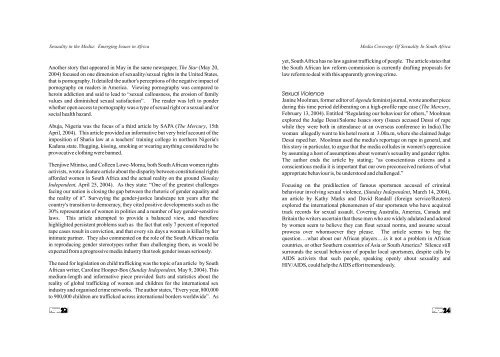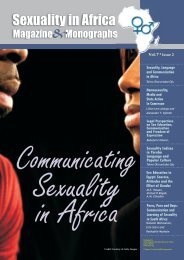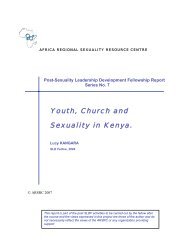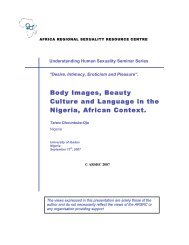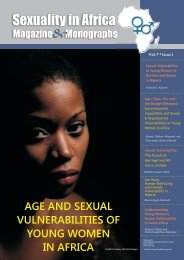Sexuality in Media: Emerging Issues in Africa - Africa Regional ...
Sexuality in Media: Emerging Issues in Africa - Africa Regional ...
Sexuality in Media: Emerging Issues in Africa - Africa Regional ...
Create successful ePaper yourself
Turn your PDF publications into a flip-book with our unique Google optimized e-Paper software.
<strong>Sexuality</strong> <strong>in</strong> the <strong>Media</strong>: Emerg<strong>in</strong>g <strong>Issues</strong> <strong>in</strong> <strong>Africa</strong><br />
Another story that appeared <strong>in</strong> May <strong>in</strong> the same newspaper, The Star (May 20,<br />
2004) focused on one dimension of sexuality/sexual rights <strong>in</strong> the United States,<br />
that is pornography. It detailed the author's perceptions of the negative impact of<br />
pornography on readers <strong>in</strong> America. View<strong>in</strong>g pornography was compared to<br />
hero<strong>in</strong> addiction and said to lead to “sexual callousness, the erosion of family<br />
values and dim<strong>in</strong>ished sexual satisfaction”. The reader was left to ponder<br />
whether open access to pornography was a type of sexual right or a sexual and/or<br />
social health hazard.<br />
Abuja, Nigeria was the focus of a third article by SAPA (The Mercury, 15th<br />
April, 2004). This article provided an <strong>in</strong>formative but very brief account of the<br />
imposition of Sharia law at a teachers' tra<strong>in</strong><strong>in</strong>g college <strong>in</strong> northern Nigeria's<br />
Kaduna state. Hugg<strong>in</strong>g, kiss<strong>in</strong>g, smok<strong>in</strong>g or wear<strong>in</strong>g anyth<strong>in</strong>g considered to be<br />
provocative cloth<strong>in</strong>g were banned.<br />
Thenjiwe Mt<strong>in</strong>tso, and Colleen Lowe-Morna, both South <strong>Africa</strong>n women rights<br />
activists, wrote a feature article about the disparity between constitutional rights<br />
afforded women <strong>in</strong> South <strong>Africa</strong> and the actual reality on the ground (Sunday<br />
Independent, April 25, 2004). As they state: “One of the greatest challenges<br />
fac<strong>in</strong>g our nation is clos<strong>in</strong>g the gap between the rhetoric of gender equality and<br />
the reality of it”. Survey<strong>in</strong>g the gender-justice landscape ten years after the<br />
country's transition to democracy, they cited positive developments such as the<br />
30% representation of women <strong>in</strong> politics and a number of key gender-sensitive<br />
laws. This article attempted to provide a balanced view, and therefore<br />
highlighted persistent problems such as the fact that only 7 percent of reported<br />
rape cases result <strong>in</strong> conviction, and that every six days a woman is killed by her<br />
<strong>in</strong>timate partner. They also commented on the role of the South <strong>Africa</strong>n media<br />
<strong>in</strong> reproduc<strong>in</strong>g gender stereotypes rather than challeng<strong>in</strong>g them, as would be<br />
expected from a progressive media <strong>in</strong>dustry that took gender issues seriously.<br />
The need for legislation on child traffick<strong>in</strong>g was the topic of an article by South<br />
<strong>Africa</strong>n writer, Carol<strong>in</strong>e Hooper-Box (Sunday Independent, May 9, 2004). This<br />
medium-length and <strong>in</strong>formative piece provided facts and statistics about the<br />
reality of global traffick<strong>in</strong>g of women and children for the <strong>in</strong>ternational sex<br />
<strong>in</strong>dustry and organised crime networks. The author states, “Every year, 800,000<br />
to 900,000 children are trafficked across <strong>in</strong>ternational borders worldwide”. As<br />
<strong>Media</strong> Coverage Of <strong>Sexuality</strong> In South <strong>Africa</strong><br />
yet, South <strong>Africa</strong> has no law aga<strong>in</strong>st traffick<strong>in</strong>g of people. The article states that<br />
the South <strong>Africa</strong>n law reform commission is currently draft<strong>in</strong>g proposals for<br />
law reform to deal with this apparently grow<strong>in</strong>g crime.<br />
Sexual Violence<br />
Jan<strong>in</strong>e Moolman, former editor of Agenda fem<strong>in</strong>ist journal, wrote another piece<br />
dur<strong>in</strong>g this time period deliberat<strong>in</strong>g on a high-profile rape case (The Mercury,<br />
February 13, 2004). Entitled “Regulat<strong>in</strong>g our behaviour for others,” Moolman<br />
explored the Judge Desai/Salome Isaacs story (Isaacs accused Desai of rape<br />
while they were both <strong>in</strong> attendance at an overseas conference <strong>in</strong> India).The<br />
woman allegedly went to his hotel room at 3.00a.m, where she claimed Judge<br />
Desai raped her. Moolman used the media's reportage on rape <strong>in</strong> general, and<br />
this story <strong>in</strong> particular, to argue that the media colludes <strong>in</strong> women's oppression<br />
by assum<strong>in</strong>g a host of assumptions about women's sexuality and gender rights.<br />
The author ends the article by stat<strong>in</strong>g; “as conscientious citizens and a<br />
conscientious media it is important that our own preconceived notions of what<br />
appropriate behaviour is, be understood and challenged.”<br />
Focus<strong>in</strong>g on the predilection of famous sportsmen accused of crim<strong>in</strong>al<br />
behaviour <strong>in</strong>volv<strong>in</strong>g sexual violence, (Sunday Independent, March 14, 2004),<br />
an article by Kathy Marks and David Randall (foreign service/Reuters)<br />
explored the <strong>in</strong>ternational phenomenon of star sportsmen who have acquired<br />
track records for sexual assault. Cover<strong>in</strong>g Australia, America, Canada and<br />
Brita<strong>in</strong> the writers ascerta<strong>in</strong> that these men who are widely adulated and adored<br />
by women seem to believe they can flout sexual norms, and assume sexual<br />
prowess over whomsoever they please. The article seems to beg the<br />
question….what about our <strong>Africa</strong>n players….is it not a problem <strong>in</strong> <strong>Africa</strong>n<br />
countries, or other Southern countries of Asia or South America? Silence still<br />
surrounds the sexual behaviour of popular local sportsmen, despite calls by<br />
AIDS activists that such people, speak<strong>in</strong>g openly about sexuality and<br />
HIV/AIDS, could help the AIDS effort tremendously.


